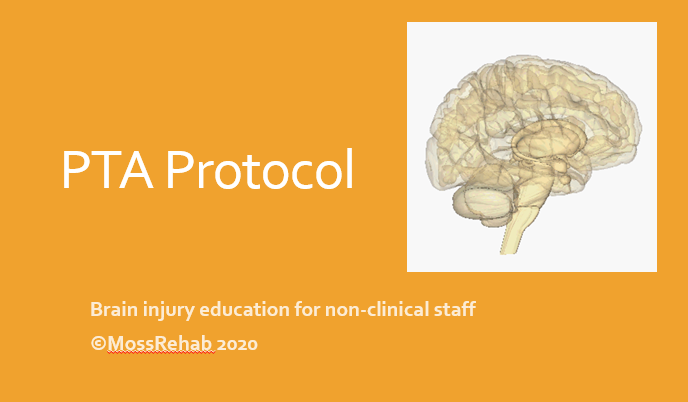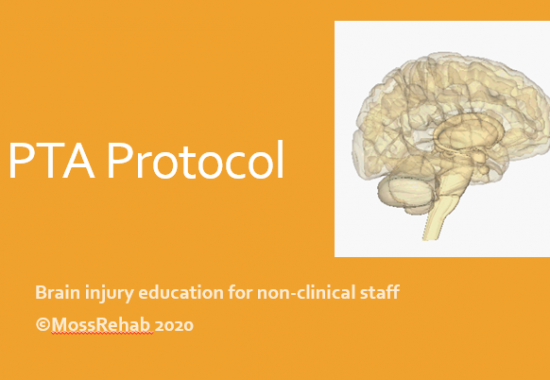
A team of researchers at MRRI and clinicians at MossRehab recently came together to address an important clinical issue—how to best care for patients with severe memory deficits due to acute traumatic brain injury (TBI). With the support of the Moss Traumatic Brain Injury Model Systems, Dr. Amanda Rabinowitz and Dr. Mary Ferraro led a workgroup to develop an evidence-based protocol for treatment. The workgroup included supervisors from each of the major rehabilitation disciplines – Elizabeth Marcy (Physical Therapy), Stephanie Farm (Occupational Therapy), Deb Presutti (Speech Therapy), Nicole Bongart (Nursing), Lisa Pinder (Nursing), Dr. Eileen Fitzpatrick (Neuropsychology), as well as MRRI Visiting Scholar, Dr. Lyn Turkstra. Dr. Tessa Hart led an accompanying research study to evaluate the impact of the protocol. The results of this study were recently published in the journal Brain Injury.
Post-traumatic amnesia (PTA) is a state of confusion brought on by physical and chemical changes in the brain after a TBI. Patients may exhibit confusion, disorientation, retrograde amnesia (loss of memory for things that occurred prior to the event), inability to store new memories, and sometimes agitation and delusions. Frequently, patients with TBI are admitted to inpatient rehabilitation during PTA. The duration of PTA may last for a few minutes, or up to several weeks or months depending on the severity of the injury. Hence, many patients with TBI spend a significant portion of their inpatient rehabilitation stay in a state of PTA.
Can patients with memory impairments due to PTA benefit from rehabilitative treatment? Fortunately, the answer appears to be yes. During PTA, the implicit memory system—which enables learning of new skills and routines—is still functioning normally. As a result, rehabilitative approaches that focus on procedural learning are effective. However, difficulties with the explicit memory system interfere with learning and recall of fact-based and biographical information. These deficits pose a challenge for communication between patients and their families and care providers.
Patients are asked many questions in the course of treatment that rely on recall of information stored in the explicit memory system—questions about personal history, medical information, orientation, and recent events. Attempts to respond to these questions may cause anxiety and frustration, and furthermore, run the risk of patients providing inaccurate information that may impact the treatment planning process.
The workgroup developed a protocol for identifying patients in PTA, materials to guide communication and treatment, and a staff-training package. The training includes guidance on appropriate treatment and communication strategies, with emphasis on avoiding questions that require retrieval from explicit memory. Instead, clinicians are encouraged to use “here and now questions” and gather clinical information via observation, medical records, or a reliable family member.
Because patients’ rehabilitation experience extends beyond their contact with treating clinicians, separate training materials were developed that were specifically tailored towards staff from ancillary departments—such as dietary, housekeeping, and chaplaincy—who regularly interact with patients in PTA. Educational materials for family members were also provided to help patients’ loved ones understand their communication needs and behaviors. Staff were trained to use informational flyers to educate families on PTA and to guide them in using techniques for communicating with and supporting their loved one during rehabilitation.
Roll-out of the PTA protocol took place at the Drucker Brain Injury Center at MossRehab in 2019. In order to evaluate the impact of the protocol on staff behavior, we observed patients’ interactions with staff during the normal course of an inpatient day both before and after training. We coded the verbal exchanges with attention to inappropriate questions—those that rely on retrieval of information from long-term memory—that were posed to patients in PTA. These inappropriate questions included requests for information from recent or remote memory (e.g. “Do you have any allergies”), or “quiz” type questions where the questioner knows the answer they are looking for (e.g. “What’s my name?”).
Our findings were striking. We saw a significant decrease in the number of information request and quiz-type questions posed to patients, which reduced from over 16 such questions per hour for the typical patient, to fewer than 2. However, the number of appropriate “here and now” questions posed to patients by staff remained unchanged. We also obtained feedback from clinicians in an anonymous survey. The majority reported positive changes in their practice and improved team communication as a result of the training. Clinicians indicated that they were not only reducing the number of declarative memory questions they asked, but they were also providing patients with more information and reassurance.
The protocol is now available for download here.
You can learn more about the protocol, and our study results here.


5 comment on “Development and Evaluation of a Clinical Protocol for Patients with Post-Traumatic Amnesia”